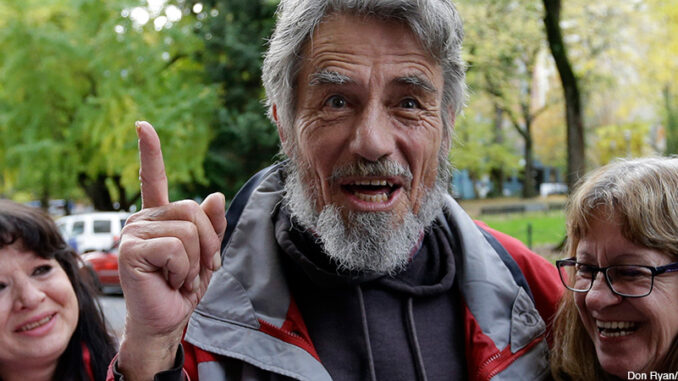
This winter, btw brought you news about the armed takeover of Oregon’s Malheur National Wildlife Refuge. Last week, after a six-week trial, the ringleaders of the occupation–including Ammon Bundy, his brother Ryan, and five others–have been acquitted of all charges brought against them by the federal government.
Background
In January 2016, the Bundy brothers and 26 others took control of the Malheur bird refuge 225 miles southeast of Portland, and occupied its buildings for 41 days. They called themselves “Patriots” and argued that they were protesting for the rights of rural ranchers. During the takeover, the armed occupants staged daily news conferences and posted online videos asking supporters to send guns to aid their cause. The standoff with federal officers lasted six weeks, until one of the protesters, LaVoy Finicum, was shot and killed by a state trooper during a traffic stop. On February 11, the last four occupiers surrendered to authorities, and the standoff ended peacefully.
The Trial
All seven defendants were charged with conspiracy to impede federal officers, and possession of firearms in a federal facility with intent to commit a crime. One of the occupiers was also charged with stealing a government-owned truck, and Ryan Bundy was charged with destroying government cameras located on the property.
However, the defendants argued that they were merely staging a spontaneous, peaceful political protest and were not engaged in any conspiracy. Also, while 30 guns were found on the property after the standoff, the defense argued that they did not intend to use the weapons in a violent manner; rather, they said, guns are simply a part of rural culture, much like a cowboy hat or boots. They claimed that they were merely protesting government actions and did not pose a public threat. As a result, the defendants were found not guilty of all charges (the jury was hung on Ryan Bundy’s theft charge). The jurors have since stated that while they do not agree with what the occupiers did, they nevertheless found the prosecutor’s case unconvincing enough to convict the Bundys and their fellow defendants.
Public Response
While members of the so-called Patriot Movement and others support the jury’s decision, many other groups, such as Black Lives Matter, are furious about the acquittals. Those who are angry suggest that race played a factor in the trial’s outcome, since all of the defendants were white, contrasting the way that black and white defendants are treated by law enforcement and the courts.
This idea seems supported by the fact that on the same day that the Bundys and their followers were acquitted, law enforcement officials arrested 141 people in North Dakota for peacefully blocking an oil pipeline project on the Standing Rock Sioux Reservation. The tribal leaders of the North Dakota protests have condemned any use of violence. Despite this, law enforcement there has been heavily armed and clad in riot gear. They have also used SWAT trucks, tear gas, pepper spray, bean bags, and sound cannons to combat protestors, despite the fact that the protestors remain unarmed. So far, a total of 410 peaceful protestors have been arrested in the North Dakota standoff. By contrast, law enforcement took a more “low key” approach to the Oregon standoff, choosing to negotiate with the armed occupiers and allowing them to remain in control of the wildlife refuge for nearly 40 days without a single arrest.
What’s Next?
It is important to note that despite these seven acquittals, the case against the Malheur occupiers is far from closed. A second group of seven occupiers is scheduled for trial in February. Also, both Bundy brothers, as well as their father, Cliven Bundy, are still being held in federal custody and will stand trial in Nevada next year for a similar standoff at their Nevada ranch in 2014. Eleven others have already pleaded guilty to the charges. However, many experts worry that the verdict will embolden other extremist groups to take similar actions against the federal government in the future.
